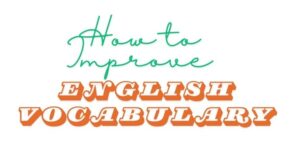Learning English vocabulary can seem like a daunting task, especially for busy professionals who have limited time to dedicate to studying. However, with the right strategies, you can learn English vocabulary and improve English speaking skills efficiently. This blog will provide you with practical tips on how to boost English vocabulary quickly, even with a busy schedule.

Why Is Learning English Vocabulary Important?
Before diving into the tips, it’s important to understand why building a strong vocabulary is crucial. A rich vocabulary helps you express yourself clearly and confidently. It allows you to understand others better and engage in more meaningful conversations. For professionals, a good command of English vocabulary can open doors to new career opportunities and enhance job performance.
How to Boost English Vocabulary Fast
1. Set Realistic Goals
Setting realistic goals is the first step towards achieving anything, including learning English vocabulary. Start by defining what you want to achieve and by when. For example, aim to learn 10 new words per week.
How to Set Effective Goals
- Specific: Be clear about what you want to learn. Instead of saying, “I want to improve my vocabulary,” say, “I want to learn 10 new business-related words this week.”
- Measurable: Track your progress. Use a journal or an app to note down the words you learn.
- Achievable: Make sure your goals are realistic. Don’t aim to learn 50 words in a week if you only have an hour to study.
- Relevant: Focus on vocabulary that is relevant to your profession and daily life.
- Time-bound: Set a deadline to achieve your goals. This helps you stay focused and motivated.
2. Use Flashcards
Flashcards are a classic tool for learning new words. They are easy to use and can be carried anywhere, making them perfect for busy professionals.
How to Use Flashcards
- Create Your Own Flashcards: Write the word on one side and its meaning, along with a sentence, on the other side.
- Use Flashcard Apps: Apps like Anki and Quizlet can be very useful. They use spaced repetition to help you remember words better.
- Review Regularly: Spend a few minutes each day reviewing your flashcards. Consistent review helps reinforce your memory.
3. Incorporate Vocabulary into Daily Life
Using new words in your daily conversations and writing helps reinforce your learning. It also makes the learning process more practical and enjoyable.
How to Incorporate New Words
- Daily Conversations: Try to use new words in your conversations with colleagues and friends.
- Writing Practice: Write emails, reports, or even journal entries using new vocabulary.
- Reading and Listening: Engage with English media like books, podcasts, and news articles. This not only exposes you to new words but also helps you see how they are used in context.
4. How to Boost English Vocabulary with English Media
Consuming English media is a fun and effective way to improve your vocabulary and speaking skills. It immerses you in the language and helps you learn in a natural context.
Types of Media to Engage With
- Books and Articles: Choose materials that interest you. For example, if you love technology, read tech blogs and articles.
- Movies and TV Shows: Watch shows and movies in English. Pay attention to the dialogues and try to understand the context in which new words are used.
- Podcasts and Audiobooks: These are great for listening practice. You can listen to them while commuting or exercising.
5. Use Vocabulary Apps
Vocabulary apps are designed to make learning new words easy and fun. They often use gamification to keep you engaged and motivated.
Popular Vocabulary Apps
- Duolingo: Offers bite-sized lessons that help you learn and practice new words.
- Memrise: Uses spaced repetition and mnemonic techniques to help you remember words.
- WordUp: Provides detailed information about each word, including its usage and synonyms.
6. Join a Study Group
Studying with others can make the learning process more enjoyable and less isolating. It also provides an opportunity to practice speaking and using new vocabulary.
How to Form or Join a Study Group
- Online Communities: Join online forums and social media groups dedicated to learning English.
- Local Meetups: Look for local language exchange meetups where you can practice English with native speakers and other learners.
- Workplace Groups: Start a vocabulary study group with your colleagues.
7. Practice Speaking Regularly
Speaking practice is essential for improving your English speaking skills and for reinforcing new vocabulary. It helps you become more confident and fluent.
How to Practice Speaking
- Language Exchange Partners: Find a language exchange partner with whom you can practice speaking English.
- Professional Settings: Use new words in meetings, presentations, and professional discussions.
- Public Speaking: Join a public speaking club like Toastmasters to practice speaking in front of an audience.
8. Use Mnemonic Devices
Mnemonics are memory aids that help you remember new words by associating them with something familiar.
How to Use Mnemonics
- Create Associations: For example, to remember the word “gregarious,” you could associate it with “Greg” who is very sociable.
- Use Acronyms: Create acronyms to remember lists of words. For example, “FANBOYS” helps you remember the coordinating conjunctions: For, And, Nor, But, Or, Yet, So.
- Storytelling: Create a short story using new vocabulary words. This helps you remember the words in a context.
9. How to Boost English Vocabulary with Regular Reviews
Regular review is crucial to retaining new vocabulary. Without review, you are likely to forget what you have learned.
How to Review Effectively
- Scheduled Reviews: Set aside time each week to review your vocabulary.
- Spaced Repetition: Use spaced repetition techniques, which involve reviewing words at increasing intervals to reinforce memory.
- Quiz Yourself: Test yourself regularly using flashcards or apps to see how well you remember new words.
Also read: Common Grammar Mistakes People Make During Interviews
Bonus Tips for Busy Professionals
1. Make Use of Idle Time
Busy professionals often have pockets of idle time throughout the day, such as during commutes or while waiting for meetings to start. These moments can be used to review vocabulary.
How to Utilize Idle Time
- Listen to Podcasts: Use your commute to listen to English podcasts.
- Review Flashcards: Keep a set of flashcards in your bag or use a flashcard app on your phone.
- Read Articles: Use spare moments to read articles or short stories in English.
2. Stay Consistent
Consistency is key to learning any new skill. Regular, daily practice is more effective than occasional, intensive study sessions.
How to Stay Consistent
- Set a Routine: Dedicate a specific time each day for vocabulary practice. Even 10-15 minutes can make a big difference.
- Track Progress: Keep a journal or use an app to track the words you learn and review.
- Stay Motivated: Remind yourself of the benefits of improving your English vocabulary and how it can impact your professional life.
3. Seek Professional Help
Sometimes, getting guidance from a professional can accelerate your learning process. A tutor or language coach can provide personalized instruction and feedback.
How to Find Professional Help
- Online Tutors: Platforms like iTalki and Preply offer access to experienced English tutors.
- Language Schools: Enroll in a language course at a local language school.
- Workshops and Seminars: Attend workshops and seminars focused on business English and professional communication.
Top 10 Apps for Learning English Vocabulary Fast
!0 Practical Tips to Learn English Vocabulary Fast
50 Idioms and Phrases for Fluent English
How to Speak English Fluently: No Fail Tips
Conclusion
Learning English vocabulary quickly is possible, even for busy professionals. By setting realistic goals, using effective tools like flashcards and vocabulary apps, incorporating new words into daily life, engaging with English media, and staying consistent, you can significantly improve your English speaking skills. Remember to make use of idle time, seek professional help if needed, and most importantly, enjoy the process of learning. With these tips on how to boost English vocabulary, you will be well on your way to mastering it and enhancing your professional communication. Happy learning!
